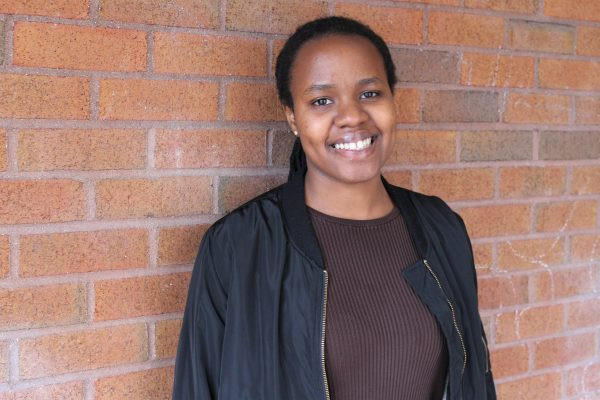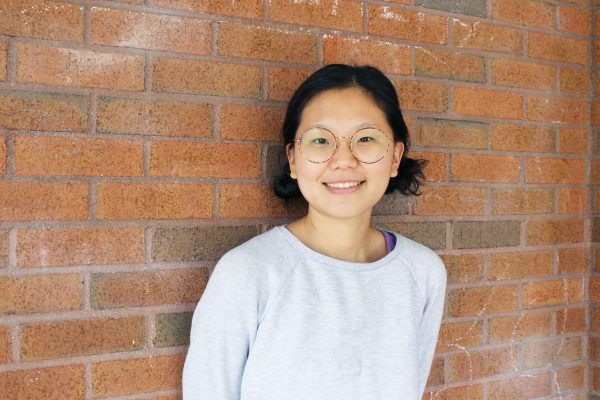Editor’s note: This is the second part of a two-part series that centers on the stories of international students on financial aid. The first part can be found online.
Though there is a stereotype that all international students in the United States are wealthy and paying for their education out-of-pocket, this is not the reality for more than 100 Tufts students. After featuring the stories of sophomore Carol Rossell and first-year Manish Aryal, today, we feature two more students who share the experience of being low-income and international.

Maureen Kalimba Isimbi, sophomore
Kalimba Isimbi is majoring in engineering psychology and minoring in engineering management. She calls Kigali, the capital city of Rwanda, her home. She spends approximately 10 hours a week working as a student assistant at the International Center (I-Center) and as an on-call math tutor. She finds that having a job is challenging on her schedule and can sometimes impact her academics or the time she needs to take care of herself.
“If I had to come here and just study without working that would be great,” she said.
However, she recognizes that having to balance school and work is giving her valuable skills.
“It’s good that I have a job because it’s giving me a lot of experience for the future,” she said.
While Kalimba Isimbi has a good financial aid package that meets most of her financial need, she expressed that Tufts could do a better job with their financial aid packages for international students, such as covering summer school tuition.
“There are some things other schools include in their financial aid that I wish Tufts included in their packages especially for low-income international students,” Kalimba Isimbi said. “For example, if you are an engineer, you need so many credits, and if you can’t study in the summer then you end up having to take six classes each semester, which is mentally and emotionally exhausting.”
Moreover, Kalimba Isimbi believes that future financial aid packages should also cover Curricular Practical Training (CPT), a program allowing international students to participate in off-campus work opportunities related to their field of study, which will nearly double in cost to $966 this summer. The cost of CPT will be waived for students with the highest need, but I-Center staff have expressed concern about the ability of others who do not qualify for the waiver to take on summer internships, according to an April 17 article in the Daily.
As the International Community Senator, Kalimba Isimbi has been advocating to set up funding for essential things that international students do not always have the funds for, such as being able to visit their family at some point during the school year.
“This past year, I was working on getting tickets for international students to go home, because it is really hard to spend four years without going home,” she said.
While Kalimba Isimbi is thankful for her generous aid package, she noted that the amount of aid an international student receives can impact how challenging their experience at Tufts might be.
“It depends on the financial aid you’re getting; if you get a good package, it relieves you in some way. When your package misses essential things, then there is pressure to work more hours and find other resources to have access to opportunities,” she said.
For instance, Kalimba Isimbi expressed that financial aid can severely impact what opportunities one has access to.
“You can’t pursue unpaid internships, because even though you are so interested in them, your financial [situation] will be suffering from that, so you have to always consider the financial aspect of an opportunity,” Kalimba Isimbi said. “All the spring break trips I’ve had have all been associated with organizations, which is the only way I can travel. When friends suggest going on a trip, I can’t go because it’s a lot of money to spend.”
Kalimba Isimbi also stressed that being low-income doesn’t just impact the social experience, but can also keep a student from attending an event beneficial to their professional growth, such as conferences and career fairs.
Being on financial aid has forced Kalimba Isimbi to always be aware of her situation. She stressed that she must always make sure she’s working so that she is financially stable in the future because expenses that come after graduation also worry her.
“You need to really save and you are always thinking about the future, which can be stressful and make you allocate more time for work when you should be studying, resting or taking care of yourself,” she said.
Overall, Kalimba Isimbi believes that Tufts does a good job at giving out generous packages, but there is always room for improvement, especially in helping students have access to the full college experience outside of just tuition, room and board.
“Financial aid does a good job for some individuals who could not attend Tufts without the aid. However, the tuition rises and some essential things should be put into consideration to give all students a better experience when attending Tufts,” she said.

Raimy Shin, senior
Shin is a child study and human development and clinical psychology double major. She was born in South Korea but grew up in Thailand, so both places have become her home in different ways. Since her first year at Tufts, work has been one of Shin’s constant activities.
“In my first two years, work was my priority so I would change my class schedule in order to fit my work schedule,” she said.
Currently she works as a sound technician at Cohen Auditorium and front desk staff assistant at the Eliot-Pearson Children’s School. Additionally, she is completing an unpaid internship at Massachusetts General Hospital, which she would not be doing if not for her clinical psychology major requirements, because she does not have the time to do any unpaid work.
For Shin, balancing work and academics is nothing new, since she has been doing it even before she got to Tufts.
“I’ve worked since I was in middle school, so I think it’s natural to me and not having a job would feel weird,” she said.
Shin has always been aware of the fact that participating in certain social activities means spending money, therefore she’s always worked hard and saved enough money, which gives her a sense of pride.
“I make sure that I am not missing out socially, even if it means having to work a little harder for it, but I’ve always done that,” she said.
Despite it being challenging at times, Shin enjoys being able to have a job while she goes to school because of everything she has gained from her work experiences.
“It is a positive actor in my life instead of something that is difficult,” she said.
Even though she’s found a lot of growth through working, Shin must be selective when it comes to choosing what opportunities to pursue.
“I think that the fact that I am not even thinking about unpaid internships limits me because there are a lot of great opportunities in college that are unpaid but I can’t do them. Sometimes I have to do opportunities not as related to my major simply because they are paid,” she said.
Despite having to pay for books and other essential things herself, Shin feels grateful and lucky for the financial support Tufts has given her.
“I have felt really supported and I feel like I have had individual attention. The financial aid office has seen me as a person,” she said.
However, the support does not stop her from frequently feeling anxious about her financial insecurity.
“[One challenge is] never having security and knowing if I’m able to come back next year,” Shin said. “I think more than the logistical challenges, it’s that feeling that I don’t have control over my own education, and no matter what I do, it can be pulled from under me if someone decides not to fund me anymore.”
Something else that Shin has to deal with is the dominant, stereotypical narrative associated with being an international student.
“The dominant narrative is that we bring the money to the school and are wealthy and travel all the time. My narrative is that I am filing taxes and financial aid, [using my personal] documents that aren’t in English, my parents don’t speak English, and I have to do it all alone,” she said.
Additionally, Shin finds that it can be difficult dealing with her multiple and intersecting identities on an institutional level.
“I think being international is one layer of my identity and being low income is another part of my identity, and people don’t understand the intersection between those identities,” Shin said. “Sometimes I call one office and they send me to another office and vice-versa, and I wonder where are the resources that can coordinate this for me instead of doing it all by myself, and it’s a lot of work that goes unrecognized.”
Aside from identifying as an international and low-income student, Shin is also a first-generation student, and this has impacted her experience as well.
“The more educated I become, the less connected I feel to my family, because they are not educated. The way that they see me is so distant. It’s great that I am gaining more opportunities, but if it means leaving my family behind, it’s not a sacrifice I want to take. I don’t think people who have parents and family who are educated face that kind of dilemma,” she said.
During her time at Tufts, Shin has been able to find a support system that has made going through challenges easier.
“I don’t know about everyone, but my friends are very accommodating and I’ve been so grateful for that,” she said.
As vice-president of the International Club, Shin has also been working all year to ensure that information about additional financial resources available to international students is easy to access. She believes that more could be done to ensure that low-income international students have a better college experience.
“I think being international is a big part of who you are when you are in the United States, so the other identities you relate to can be forgotten. Being low-income and international is a very specific experience and more could be done to cater to that experience,” she said.






